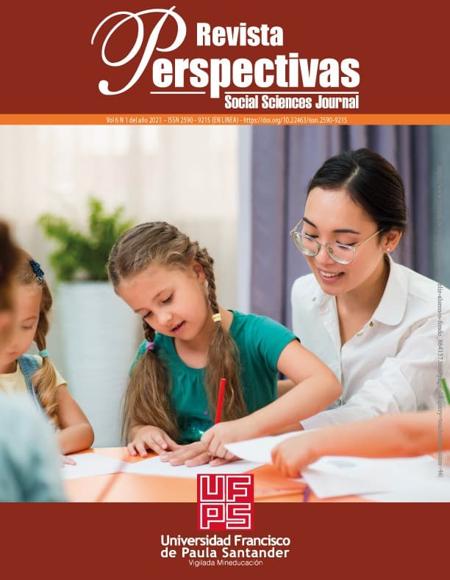Critical pedagogy in citizenship education: the case of the University of Pamplona
Pedagogía crítica en la formación ciudadana: caso universidad de pamplona
Main Article Content
This research proposal seeks to provide an answer to the following question: if higher education projects new spaces for the creation, interaction and participation of teachers and students, then how should autonomous citizenship be trained from higher education at the university of pamplona ? to this end, it is planned to develop curricular guidelines for training in autonomous citizenship for higher education at the university of pamplona, based on representatives of this institution as well as teachers and students. it will be deepened from the theoretical line of Martínez (2001) that states: it is required to train not only citizens who defend and fight for the rights of the first and second generation, but also recognize the difference as a factor of progress and are willing to fight to that these do not induce inequalities and injustices, even at the cost of the exercise of certain levels of enjoyment of rights, by them. this proposal is a case study, the qualitative research installed in the interpretive paradigm will be used as an epistemological reference, where the hermeneutical-critical analysis based on the theory of symbolic interactionism prevails, supported by the theory based for the construction of the findings.
in this order of ideas, strategies were developed that made it possible to identify citizenship training in bachelor's degree students in child pedagogy by applying techniques such as the focus group, to conclude some conclusions are drawn that show the perceptions of teachers and students regarding critical thinking.
Downloads
Article Details
Cajiao, F. (2005). Enseñanza aprendizaje y deserción escolar. Revista economía colombiana y coyuntura política, 311(5), 1-12.
Clarke, P. (2010). Ser ciudadano y praxis. Madrid: Editorial Sequitur.
Delli, M. & Keeter, S. (1996). What americans know about politics and Why it matters. New Haven: Yale University Press
Dewey, J. (1953). Democracia y Educación. Una introducción a la filosofía de la educación. Buenos Aires: Losada.
Echeverry, M. (2011). Formación ciudadana y escuela Una mirada desde la ciudadanía democrática. Cali: Universidad del Valle.
Erickson, F (1982). La investigación en la enseñanza. Barcelona: Paidós.
Freire, P. (1970). Pedagogia do oprimido. Rio de Janeiro: Paz e Terra.
Freire, P. (2008). Pedagogía de la autonomía. Siglo XXI: México.
Freire, P. (2010). Cartas a quien pretende enseñar. Siglo XXI: México.
Freire, P. (2011). La educación como práctica de la libertad. México: Siglo XXI.
Freire, P. (2011). Pedagogía de la esperanza, un reencuentro con la pedagogía del oprimido. Siglo XXI: México.
Freire, P. (2012). Pedagogía del Oprimido. Siglo XXI: Buenos Aires.
Giroux, H. (2001). Los profesores como intelectuales transformativos. Revista Docencia, 5(12), 60-66.
Giroux, H. (2003). Pedagogía y política de la esperanza. Teoría, cultura y enseñanza. Buenos Aires: Amorrortu.
Giroux, H. (2006). La escuela y la lucha por la ciudadanía. México, Siglo XXI.
Giroux, H. (2012). Metodología de las ciencias humanas. México: Fondo de Cultura Económica.
Gonzales, E. (2016). Acerca del estado de la cuestión o sobre un pasado reciente en la investigación cualitativa con enfoque hermenéutico. Unipluriversidad, 13(1), 60- 63.
Habermas, J. (1999). La Inclusión del Otro. Barcelona: Paidós
Jiménez, B. (2000).Investigación cualitativa y psicología social crítica. Contra la lógica binaria y la ilusión de la pureza. Investigación cualitativa en Salud, 45(1), 1-12. Recuperado de: http://www.cge.udg.mx/revistaudg/rug17/3invesigacion.html
Lawy, S. & Biesta, J. (2006). Citizenship-as-practice: the educational implications of an inclusive and relational understanding of citizenship. British Journal of Educational Studies, 54(1), 34-50. DOI: https://doi.org/10.1111/j.1467-8527.2006.00335.x
Ley 115 de 1994. Por la cual se expide la ley general de educación. Bogota: Diario Oficial.
Malhotra, N, (1997). Investigación de mercados un enfoque práctico. Barcelona: Prentice Hall.
Martínez, M. (2001). El contrato moral del profesorado. Condiciones para una nueva escuela. Bilbao: Desclée de Brouwer.
McLaren, P. (2005). La vida en las escuelas: una introducción a la pedagogía crítica en los fundamentos de la educación. México: Siglo XXI.
Nussbaum, M. (2012). Sin fines de lucro: por qué la democracia necesita de las humanidades. Bogotá: Katz.
Organización de las Naciones Unidas. (1948). Declaración Universal de los Derechos Humanos, (Art.26). Recuperado de: https://dudh.es/26/
Ortega, P. (2009). La Pedagogía Crítica: Reflexiones en torno a sus prácticas y sus desafíos. Pedagogía y Saberes, 31(4), 22-35.
Pocovi, P. (2005). La entrevista y los medios electrónicos. Recuperado de: http://imgbiblio.vaneduc.edu.ar/fulltext/files/TC113921.pdf
Ramírez, R. (2008). La pedagogía crítica Una manera ética de generar procesos educativos. Revista Folios, 28(1), 108-119. DOI: https://doi.org/10.17227/01234870.28folios108.119
Rovira, J. (1996). Cómo fomentar la participación en la escuela. Serie Pedagogía: Teoría y Práctica. Barcelona: Grao.
Sen, A. (2000). Desarrollo y libertad. Barcelona: Planeta.
Strauss, A. & Corbin, J. (2002). investigación cualitativa. Técnicas y procedimientos para desarrollar la teoría fundamentada. Antioquia: Universidad de Antoquia.
Universidad de Pamplona. (2012). Actualización PEI y pensamiento pedagógico 2012. Recuperado de: http://www.unipamplona.edu.co/actualizacion_pei.jsp
Uribe, S., Zapata, A. & Gómez, B. (2002). Investigación evaluativa. Bogota: Instituto Colombiano para el Fomento de la Educación Superior.







